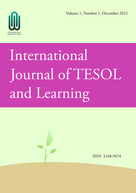


Volume 11 Issues 1-4 (2022-12-31)
Volume 10 Issues 3&4 (2021-12-31)
Volume 10 Issues 1&2 (2021-06-30)
Volume 9 Issues 3&4 (2020-12-31)
Volume 9 Issues 1&2 (2020-06-30)
Volume 7 Issues 3&4 (2018-12-31)
Volume 6 Issues 3&4 (2017-12-31)
Volume 6 Issues 1&2 (2017-06-30)
Volume 5 Issues 1&2 (2016-06-30)
This article argues that explicit teaching of grammatical features and linguistic choices of language used for different purposes should be provided to ESL and EFL learners as an effective pedagogical activity. Focusing on nominalization, the author first compares features of academic writings and non-academic writings, then briefly reviews Systemic Functional Linguistics knowledge to explain why and how nominalization could be explained as a key feature of EAP writing from the three Metafunctions. The article ends with some pedagogical suggestions on how to help L2 students understand and use nominalizations from a functional perspective.
This study aims to detect the factors influencing Turkish learners’ production of English collocations. Working specifically on verb-object noun combinations, the effects of three important factors were analyzed: restriction on the combinability of words, semantic transparency, and L1 transfer. A learner corpus was compiled from 76 writing exam papers written by 11th graders at a public school. After the corpus was tagged for part of speech, verb-noun collocations were automatically extracted using a concordancer. Manual analysis of the data revealed a total of 111 collocations, of which 30 were marked as incorrect-use. Although restriction did not seem to be a factor, participants performed slightly worse when the target collocations were semantically less transparent. In addition, L1 proved to have an appreciable effect on the acceptability of collocational production in that learners seemed unable to recognize that the target collocations were not free combinations but fixed phrases that need to be learned as single items.
The present study aims to focus on students’ expectations of teachers’ feedback and teachers’ actual practice in a higher-education background to reveal the discrepancy between the two. 178 undergraduate students majoring in English from four different grades in a Chinese university filled out a questionnaire investigating students’ expectations, teachers’ actual feedback and its effectiveness on students’ L2 writing. The collected data were analyzed by SPSS and the results show that students require detailed feedback, such as more marginal correction and end comments. Teachers tend to provide form feedback, but students want more content feedback on expression, structure and content ideas. Moreover, students believe that teachers’ feedback can improve their English writing and their expectation is high. However, they do not think that teachers’ feedback functions well to improve their writing, though teachers’ feedback indeed helps them correct errors. The paper concludes that students benefit a lot from teachers’ feedback in grammar and vocabulary which are more emphasized by teachers, but this cannot fulfill students’ expectations. Students want more advice in structure and content idea. Therefore, they think they make little improvement in their writing except the surface-level progress: grammar and vocabulary.
The 3rd Untested Ideas International Research E-Conference
Identifying Untested Practices
June 26 – 28, 2015
The 3rd Untested Ideas International Research E-Conference
Identifying Untested Practices
June 26 – 28, 2015